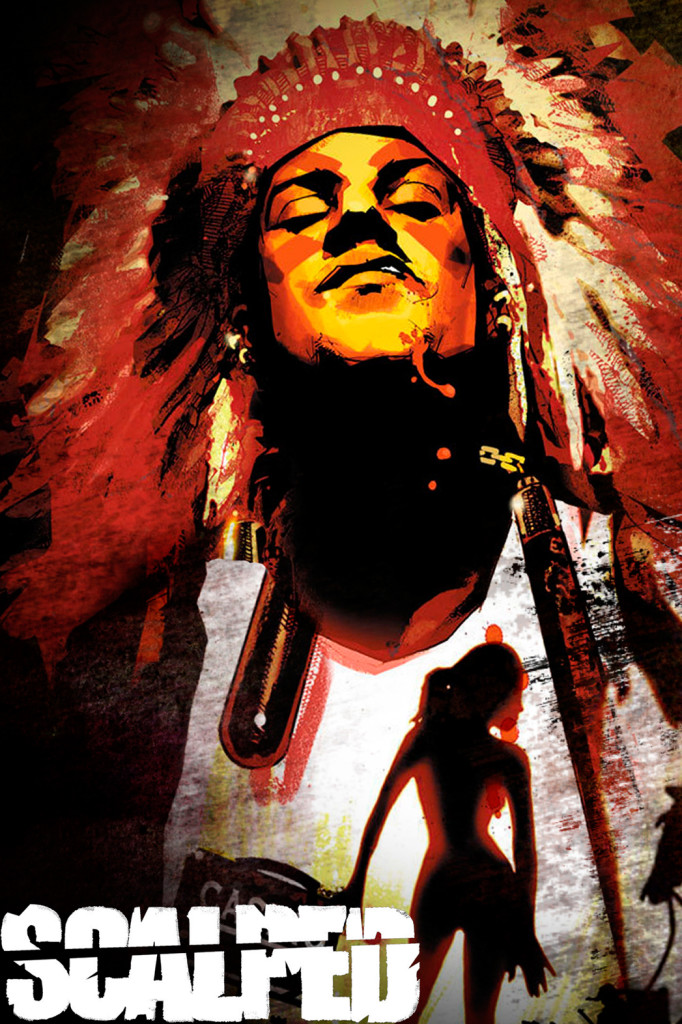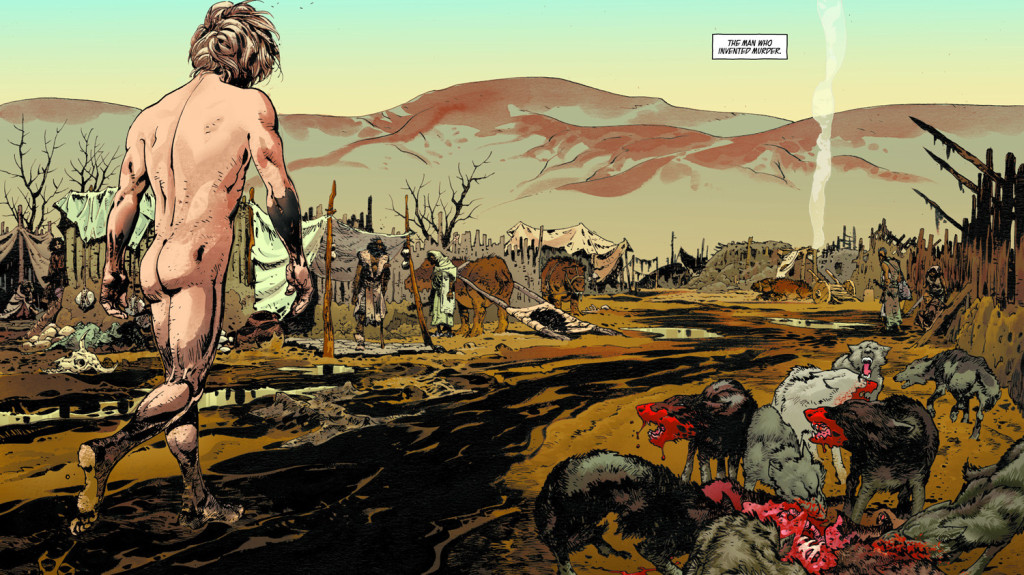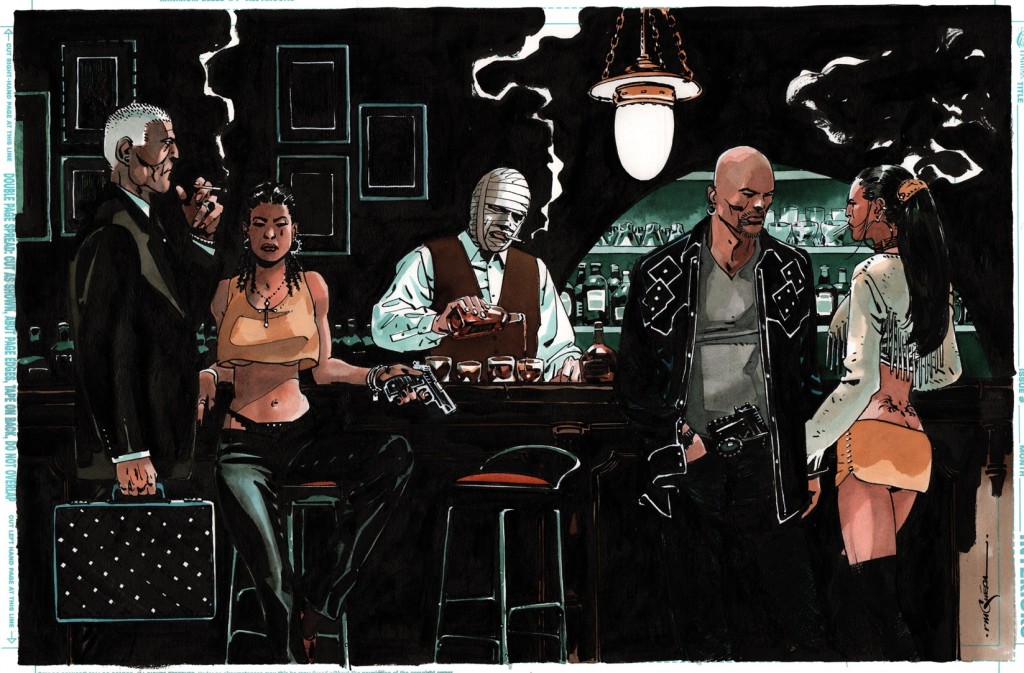Genre: TV Pilot – Drama
Premise: A modern day Indian reservation finds itself in trouble when two rival leaders go toe-to-toe regarding the reservation’s casino.
About: Doug Jung has been scribbling his way up the screenwriting ladder lately, penning the latest Star Trek screenplay, Star Trek Beyond, as well as rewriting the top secret JJ Abrams project, The God Particle, which Jung has re-conceived to make it part of the Cloverfield universe. “Scalped” has been a buzzy project due to it being based on a hip comic book that will star an all Native American cast. No whitewashing here. Perhaps it’s fitting, then, that it will appear on WGN America.
Writer: Doug Jung (based on the graphic novel by Jason Aaron)
Details: 64 pages
I read the other day that Mark Wahlberg was creating a comic book called “Alien Bounty Hunter” for the specific purpose of adapting it into a screenplay so he could build a franchise out of it.
Most writers seem baffled by this new trend – that people aren’t creating comic books because they want them to do well as comic books anymore. But so they can quickly turn them around into movie projects.
I used to get pissed off about this as well. It not only seemed like a cheat. But it spotlighted one of the biggest frustrations writers have about the industry – its fear of buying spec scripts straight up.
However, over time, I’ve warmed to the idea. I’ll occasionally read a big-budget script and struggle to understand what it would look like on the big screen. The great thing about comic books are that they give potential buyers a better understanding of what the project will look like. And when you’re putting 100 million dollars into something, don’t you want to know as much as possible about how it’s going to turn out? I know if it was my money, I would.
So all it really is is a hack. It’s the writers way of saying, “Okay, you don’t take chances on the written word? I’m going to use this workaround then.”
Which brings us to Scalped. Scalped is an example of the way that they used to do things. Nobody created this comic in the hopes of turning it into a TV show or a movie. They just wanted to write a badass comic book! And, if you talk to any comic book geek, they’ll tell you they’ve achieved just that. Scalped is supposed to be awesome. Let’s see if that’s the case in TV form.
Chief Lincoln Red Crow is the biggest name on the Lakota Indian Reservation. He owns and runs the Crazy Horse Casino, which is responsible for most of the money that runs through the community.
But you don’t build casinos on Indian reservations without fucking a few people over. And now Red Crow is paying a price for that. His biggest rival, Henry One Star, comes to him claiming he’s had a “vision,” and that to avoid a war, Red Crow needs to close down the casino pronto.
Visions carry weight in Indian reservations, but Red Crow isn’t so sure One Star’s telling the truth. There has to be something motivating him. So Red Crow sends his men out to find out what’s up.
Meanwhile, Red Crow’s investors, the Hmong from China, are pissed off. The whole reason they invested in this place was because Red Crow ran this town. If Red Crow can’t solve minor problems like this one, they’re going to fly in and solve it themselves.
The truth is, Red Crow used to be a bad dude. He wasn’t afraid to shed blood to get what he wanted. But, recently, he’s made a promise to himself to no longer sacrifice his own people, his own culture, to get ahead. When the Hmong suggest killing One Star, Red Crow is vehemently against it. He’s convinced this can be dealt with diplomatically.
Of course, it’s never that easy. And as One Star ups the pressure, as the Hmong up the threats, and as old flames and estranged daughters come back to weigh in on the impending chaos, Red Crow will need to decide if his violent ways are truly behind him.
When you read any script (pilot or feature), you go into this mode of trying to figure out what it is. Is this a kidnapping movie (Taken)? Is this a garden variety procedural (Law and Order)? Is it a soapy character-driven drama (Parenthood)?
While you’re doing this, one of three scenarios occurs. One, it becomes a familiar thing, like the shows I listed above. Two, it never commits to a show-type and ends up becoming this incomprehensible mess. This is basically most of the amateur pilots I read. Or three, which is the direction every writer should be aiming for – it becomes something in between these two worlds, something that feels both familiar yet unpredictable. I’m talking about shows like Lost, like Taboo, like Better Call Saul.
That’s where I see Scalped.
And the first lesson I learned from this script is that when you start with an unfamiliar world – like an Indian reservation – you increase the chances of creating a show that’s unpredictable, because, obviously, it’s hard to predict that which you’ve never seen before.
But make no mistake. Scalped doesn’t rewrite the screenwriting rulebook. Nor should it. Yesterday, we were talking about conflict. And I’ll talk about it again, even if you’re getting sick of it.
You see, in television, conflict is paramount. It’s more important than in features because, unlike features, you don’t have an entertaining plot barreling forward at a hundred miles an hour. You can’t. There are too many episodes, too much time to fill.
The only thing you have left to entertain with, then, is conflict. What’s at the heart of Scalped’s pilot? Two rivals who are gunning for each other. Conflict with a capital “C.”
Even better, Scalped has placed a THING at the center of its plot that creates conflict in every direction it turns – the casino. You could take all of these people in this town, send them away, bring in a whole new set of people, and you’d still have tons of conflict because of this casino. That’s good writing there. Inject shit into your script that creates conflict for you.
The only missteps Scalped makes is in its storytelling. And this is why it’s so hard to write pilots. You have to set up an entire season of storylines, so that means introducing us to people who aren’t going to be interesting right away.
For example, there’s a character, Gina, who works for the government and she’s trying to get historical status for some of the Lakota land. I know this will become relevant in later episodes. But right now, it’s boring as hell, especially when you have the rivalry of Red Crow and One Star in your back pocket. It’s like when I got a Transformer for Christmas but my parents forced me to play with the slinky Uncle Ned bought me. “But daaaaad! Ironside’s right over therrrre!” (cue Carson crying)
If you ask me, I think you should rewrite a pilot until everything’s entertaining. No scene should feel like a boring setup for a storyline to be explored in a future episode. However, I understand that’s easier said than done. Still, in this ultra-competitive TV landscape, you should try.
Bottom line: Scalped is unique and definitely worth checking out.
[ ] What the hell did I just read?
[ ] wasn’t for me
[x] worth the read
[ ] impressive
[ ] genius
What I learned: Use your pilot to inject as much conflict into as many things as possible. Remember, conflict is, by definition, unresolved. And since people want to stick around until something gets resolved, it’s in your best interest to create as much conflict as possible. TV is like this sick game. You keep saying to the audience, “This is going to get resolved. You’ll see if you come back next week.” And then next week you say, “I know we didn’t resolve this. But we will soon. Come back next week.” That’s what you’re doing with conflict. You’re creating issues and problems between characters and within the plot itself that remain unresolved for as long as you can get away with it. It’s dirty, but it works.




